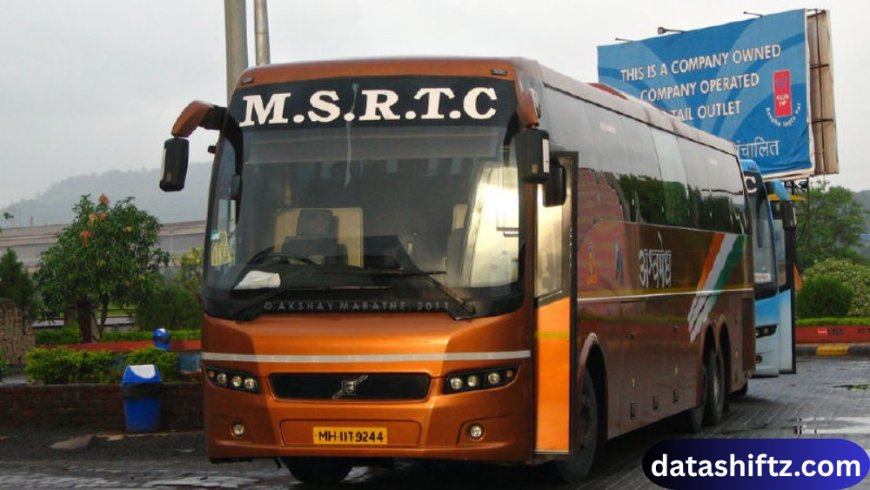MSRTC: Maharashtra State Road Transport Corporation

Introduction
The Maharashtra State Road Transport Corporation (MSRTC) is one of India’s oldest and most extensive public transport systems. Established in 1948, MSRTC has played a crucial role in connecting rural villages, towns, and cities across Maharashtra, while also offering interstate connectivity. Known for its affordability, reliability, and vast network, MSRTC is more than just a transport service—it is the backbone of mobility for millions of passengers every day. Over the years, it has modernized with newer fleets, online booking, luxury coaches, and GPS-enabled buses, ensuring that the service keeps pace with changing times.
This article explores the history, significance, services, and challenges of MSRTC, providing a comprehensive insight into its functioning.
History and Evolution of MSRTC
MSRTC’s journey began post-independence in 1948 when the Bombay State Transport Service was established. With just 50 buses, 150 employees, and a vision to connect communities, the corporation started operations. Over decades, it evolved into MSRTC after the formation of Maharashtra in 1960. Today, it operates more than 18,000 buses across the state, transporting millions of passengers annually.
The corporation’s growth has been remarkable, from simple single-deck buses to the latest luxury services like Shivneri (Volvo), Shivshahi, and Ashwamedh. These modern fleets cater to diverse passenger needs, ranging from budget travelers to business-class commuters.
Services Offered by MSRTC
MSRTC offers a wide range of services tailored to passenger requirements:
1. Ordinary Buses
These are affordable buses connecting rural and urban areas. They ensure that even the most remote village has access to public transport.
2. Semi-Luxury Buses
Equipped with better seating and comfort, these buses provide a middle ground between budget and premium travel.
3. Luxury & Premium Services
-
Shivneri (Volvo): Air-conditioned premium coaches for long routes.
-
Shivshahi: Semi-luxury AC buses introduced for affordable comfort.
-
Ashwamedh: Premium express services designed for faster connectivity.
4. Special Services
-
Ladies Special Buses for women’s safety.
-
Festival and Pilgrimage Specials for peak demand.
-
Cargo & Parcel Services for goods transportation.
5. Digital Services
Online booking, mobile apps, and GPS-enabled buses have enhanced passenger convenience, reducing dependency on physical ticket counters.
Importance of MSRTC
Social Importance
-
Connects rural areas to cities, ensuring mobility for all.
-
Provides safe and affordable travel to students, workers, and senior citizens.
-
Supports tourism by offering buses to famous destinations like Shirdi, Mahabaleshwar, Ajanta-Ellora, and more.
Economic Importance
-
Generates employment for thousands of drivers, conductors, and administrative staff.
-
Boosts trade by connecting rural markets to urban centers.
-
Enhances state revenue through passenger and freight services.
Cultural Importance
-
Acts as a cultural connector by linking people of different regions.
-
Reflects Maharashtra’s development journey and transport heritage.
MSRTC in Numbers
| Feature | Details (Approx.) |
|---|---|
| Year Established | 1948 |
| Headquarters | Mumbai, Maharashtra |
| Fleet Size | 18,000+ buses |
| Employees | 1 Lakh+ |
| Daily Passengers | 6–7 million |
| Routes Covered | 17,000+ |
| Premium Services | Shivneri, Shivshahi, Ashwamedh |
| Interstate Connectivity | Gujarat, Karnataka, Madhya Pradesh, Goa, Telangana |
Advantages of MSRTC
-
Affordable ticket pricing for all categories.
-
Wide connectivity across villages, towns, and cities.
-
Dedicated premium and luxury fleets for comfort.
-
Special services for women, students, and senior citizens.
-
Festival and pilgrimage special buses.
-
GPS-enabled buses and online booking facilities.
-
Employment opportunities for thousands in the state.
-
Plays a vital role in tourism promotion.
-
Environmentally safer compared to private vehicles.
-
A symbol of Maharashtra’s transport heritage.
Challenges Faced by MSRTC
Despite its achievements, MSRTC struggles with multiple issues:
-
Financial Burden: Operational costs, fuel expenses, and subsidies weigh heavily.
-
Competition from Private Operators: Private buses often provide faster and more comfortable services.
-
Infrastructure Issues: Poor road conditions affect timeliness and efficiency.
-
Maintenance & Aging Fleet: Many buses are old and require frequent repairs.
-
Pandemic Losses: COVID-19 significantly impacted passenger numbers and revenue.
Future of MSRTC
MSRTC is adopting modernization strategies to stay relevant:
-
Expansion of electric bus fleets for eco-friendly travel.
-
Enhanced digital platforms for seamless ticketing and real-time bus tracking.
-
Collaboration with tourism boards to boost heritage and cultural tourism.
-
Investments in bus terminals and passenger amenities.
By embracing modernization while staying true to its mission of affordable mobility, MSRTC continues to serve as the lifeline of Maharashtra.
Conclusion
MSRTC is more than just a transport corporation; it is a public lifeline connecting people, businesses, and cultures across Maharashtra and beyond. Despite financial and operational challenges, its contribution to society and economy is undeniable. With modernization and strategic reforms, MSRTC has the potential to remain a vital force in India’s public transport system for decades to come.




























